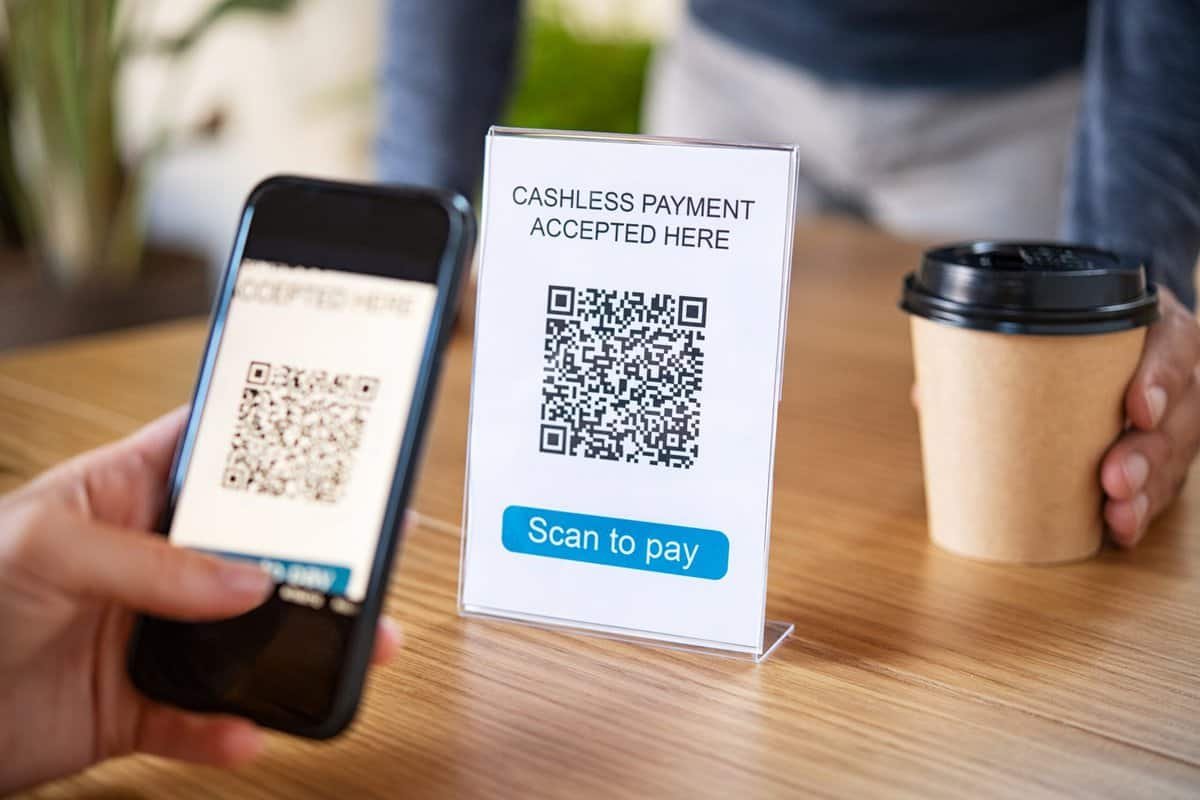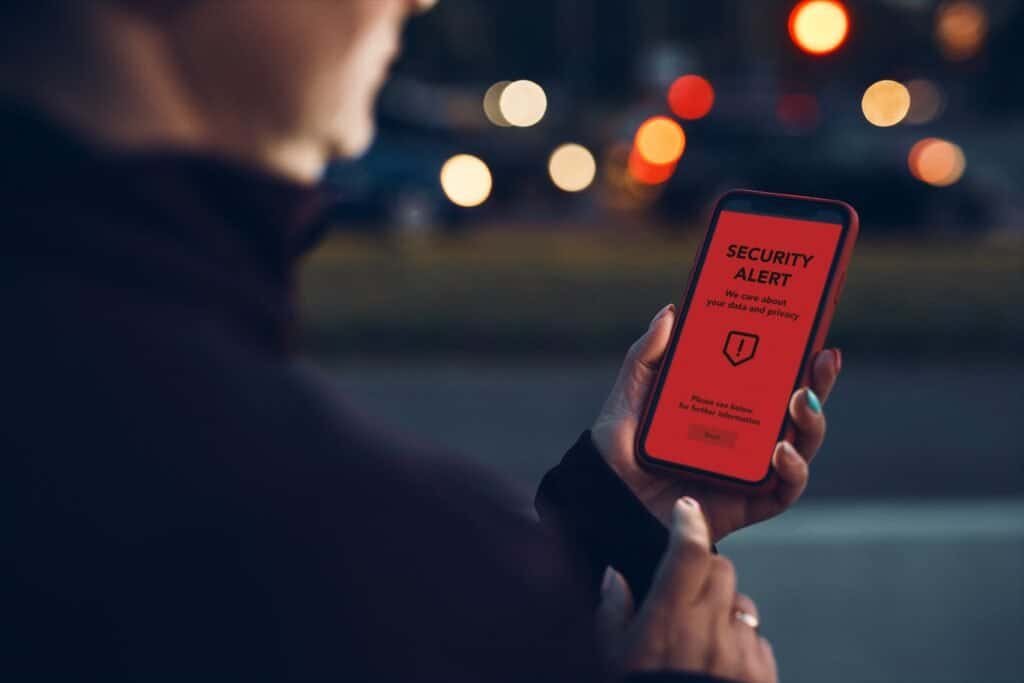QR Code Scams: How to Protect Yourself!

We may earn a small fee from the companies mentioned in this post.
QR codes have become increasingly popular in recent years, especially with the rise of contactless payments and the need for touch-free transactions. However, this popularity has also led to a growing threat: QR code scams.
As you navigate this digital world, it’s essential to understand the risks associated with QR codes and how to protect yourself from potential scams. In this blog post, we’ll delve into the various types of QR code scams, how they work, and most importantly, how you can avoid becoming a victim.
Key Takeaways
QR code scams are becoming a major security threat, with the pandemic enabling an increase in contactless methods.
Identifying and avoiding QR codes requires vigilance when scanning them. Verify sources, examine URLs & websites, use security software & trusted scanner apps.
If scammed: disconnect from Wi-Fi/Bluetooth, run antivirus scan, report incident to authorities and take long term measures such as changing passwords for extra protection.
QR Code Scams: A Growing Threat

QR code scams are escalating, posing a significant risk to personal and financial data. Not all QR codes are malicious, but considering that 53% of UK consumers struggle to recognise malicious QR codes, the need for vigilance while scanning these deceivingly innocent black and white squares is paramount.
Scammers are becoming more sophisticated, replacing legitimate QR codes with fake ones and targeting unsuspecting victims in various industries and locations.
The consequences of falling for a QR code scam can be severe, ranging from identity theft to financial loss. Staying safe requires a clear understanding of the strategies employed by scammers and the ability to identify and evade possible threats.
Minimising the risks associated with scanning QR codes is possible by getting acquainted with prevalent QR code scams and adhering to recommended safety practices.
The Pandemic’s Influence
The COVID-19 pandemic has played a significant role in the rise of QR code scams. As businesses and services adopted contactless methods to curb the spread of the virus, the use of QR codes skyrocketed in various industries, such as retail, restaurants, and hospitality.
This rapid adoption provided scammers with ample opportunities to exploit the popularity and convenience of QR codes for their nefarious purposes.
Scammers have been known to place fake QR codes over real ones, deceiving people into giving away their information or stealing cash and financial data.
The pandemic has created a fertile ground for QR code scams, further emphasising the importance of cautious use of QR codes for contactless payments and other services, along with safe scanning habits.
Target Industries and Locations
QR code scams are not limited to a single industry or location. They can be found in parking meters, restaurants, and online marketplaces among other locations. In the UK, a prevalent QR code scam involves fake parking tickets, luring unsuspecting victims into divulging their personal and financial information.
Scammers have even created fake COVID-19 testing centres, prompting people to scan a QR code to register, which leads to a fraudulent website, that requests personal and payment information.
Being aware of the various industries and locations targeted by scammers can help you stay vigilant and protect yourself from potential QR code scams. Always verify the source of the QR code before scanning it, especially in public spaces or when receiving it from an unfamiliar sender.
Common Types of QR Code Scams

There are numerous QR code scams that people should be aware of, including several common ones such as phishing attacks, malicious downloads, and fake payment requests, which are examples of QR code payment scams. Understanding how these common QR code scams work and their potential consequences can help you stay alert and avoid falling victim to them.
In the subsequent sections, we’ll explore each of these prevalent scams, along with tips to identify and guard yourself against them.
Protect yourself from Parking App scams, read our informative article
Phishing Expeditions
Phishing scams use QR codes to direct users to fraudulent websites designed to steal personal information or login credentials, leading to QR code fraud. Scammers send QR codes through email, flyers, letters, or social media that contain a QR code link to a page requesting personal data. Once the victim enters their information, the scammer gains access to their accounts and can commit identity theft or financial fraud.
Guarding yourself against phishing website scams requires wariness towards unsolicited emails, requests for personal information, and invitations to scan a QR code. If you receive a QR code in an unsolicited email, avoid scanning the code and navigate to the service independently to ensure you are accessing the legitimate app or site.
Malicious Downloads
Malicious downloads occur when scammers embed malicious links back to malware-infected web pages within QR codes. Upon scanning the QR code, the user’s device automatically opens the URL, exposing them to the malware. This can lead to the installation of harmful software on the device, which can steal personal information or damage the device.
Guarding against malicious downloads involves the following steps:
Verify the QR code’s source prior to scanning it.
Examine the URL and website associated with the QR code to ensure they are secure and legitimate.
Run security software to scan for any malicious code.
Fake Payment Requests

Fake payment requests trick users into scanning QR codes that lead to fraudulent payment portals, resulting in financial loss. Scammers often place counterfeit QR codes over genuine ones, deceiving people into divulging their data or making fraudulent purchases. These scams can be particularly difficult to detect, as they often mimic legitimate payment requests from businesses or services.
Avoiding fake payment request scams necessitates:
Not making payments through a QR code that is found in public areas or received from an unidentified sender
Double-checking the website’s URL requesting payment information
Always be cautious when scanning QR codes and stay informed about the latest scams and security threats.
How to Identify and Avoid QR Code Scams
Identifying and avoiding QR code scams hinges on maintaining vigilance and adhering to advised safety practices. Verifying the QR code’s source, scrutinising URLs and websites, and employing security software can help reduce the risks tied to scanning QR codes.
The subsequent sections will offer additional tips to safeguard yourself against potential threats.
Verifying the Source
Ensuring the QR code comes from a reputable source is a crucial step in protecting yourself from scams. Avoid scanning QR codes from unrecognisable sources or suspicious websites, as they may lead to malicious content or phishing websites. If you’re unsure about the source of a QR code, it’s better to err on the side of caution and not scan it.
When visiting the webpage with the QR code, be mindful of any misspellings or typos, as they could indicate an illegitimate source. If a company or site associated with a QR code is not recognised, avoid scanning the code and navigate to the service independently to ensure you are accessing the legitimate app or site.
Examining URLS and Websites
Before scanning a QR code, check for the following:
Secure URLs starting with “https://“
Look for a lock icon in the address bar. This indicates that the connection between the website and your device is encrypted, helping to protect your sensitive information.
Watch for any spelling errors or suspicious content on the website, as these could be signs of a scam.
Bear in mind, not all secure websites are genuine. Scammers might create persuasive fake websites with fraudulent codes with intent to steal your information, hence, validating the URL to ensure it aligns with the official website of the intended company or service is crucial. By examining URLs and websites carefully, you can avoid falling for phishing websites and QR code scams.
Utilising Security Software

Employing current antivirus software and reliable QR code scanner apps can aid in safeguarding your device from malware and other security threats linked to QR code scams. Security software can detect and block any malicious content that may be embedded in the QR code, ensuring your device remains safe and secure.
Keep your antivirus software updated regularly to stay protected against the latest security threats. Additionally, use trusted QR code scanner apps such as QR Code Reader & QR Scanner, Trend Micro QR Scanner, and Denso Wave QR Code Scanner, which offer added security features and can help you identify fake or malicious QR codes.
What to Do If You’ve Been Scammed

If you’ve been scammed, it’s important to take immediate action to minimise the damage and protect yourself from further harm. In the following sections, we’ll outline the immediate actions to take if you’ve been a victim of a QR code scam, as well as long-term measures to implement to help prevent future scams.
Immediate Actions
First and foremost, disconnect your device from Wi-Fi and Bluetooth to prevent any further communication between your device and the scammer. Run an antivirus scan on your device to detect and remove any malware that may have been downloaded as a result of the scam. Contact your bank and service provider to report the incident and follow any additional instructions they provide to secure your accounts.
Report the scam to the relevant authorities, such as your local police force and Action Fraud. This can help prevent others from falling victim to the same scam and may aid in catching the scammers responsible.
Long-Term Measures

After taking immediate action, it’s important to implement long-term measures to protect yourself and bank account from future scams. Change all your passwords promptly, and consider using a password manager to help you create strong, unique passwords for each of your accounts.
Monitor your accounts for any suspicious activity and report any unauthorised transactions to your financial institution immediately. Stay informed about the latest scams and security threats by regularly checking reliable sources and subscribing to cybersecurity newsletters. By staying vigilant and following safe QR code scanning practices, you can reduce the risk of falling victim to future scams.
Safe QR Code Scanning Practices
In essence, adopting safe QR code scanning practices is vital in shielding yourself from possible scams and security threats. Here are some tips to follow:
Use trusted scanner apps.
Verify the source of QR codes before scanning them.
Examine URLs and websites before visiting them.
Stay informed about the latest scams.
By following these practices, you can minimise the risks associated with scanning QR codes and enjoy the convenience they offer with peace of mind.
Trusted QR Code Scanner Apps
Using a trusted QR code scanner app is an important step in protecting yourself from fake QR code scams. These apps offer added security features that can help you identify malicious QR codes and avoid potentially harmful websites or downloads. Some examples of trusted QR code scanner apps include QR Code Reader & QR Scanner, Trend Micro QR Scanner, and Denso Wave QR Code Scanner.
Always download QR code scanner apps from the official iOS and Android app stores to ensure their authenticity. By using a trusted app, you can scan QR codes with confidence, knowing that you are taking the necessary precautions to protect yourself from scams and security threats.
Staying Informed
Keeping abreast of the latest scams and security threats is key in fortifying yourself against QR code scams. Regularly check reliable cyber security sources for updates on joncosson.com Consider subscribing to cybersecurity newsletters or joining forums dedicated to discussing and sharing information about QR code scams and other security threats.
By staying informed and up-to-date on the latest scams and security threats, you can better protect yourself and others from falling victim to QR code scams. Knowledge is power, and being aware of the risks and best practices for safe QR code scanning can help you navigate the digital world with confidence.
Summary
In conclusion, QR codes have become an integral part of our daily lives, offering convenience and ease of use in various industries and services. However, with their growing popularity comes the risk of scams and security threats.
By understanding the types of QR code scams, learning how to identify and avoid them, and implementing safe scanning practices, you can protect yourself and others from potential harm. Stay vigilant, informed, and proactive in your approach to QR code safety, and you can continue to enjoy the benefits of this technology without fear of falling victim to scams.
Frequently Asked Questions
How do I protect myself from QR code scams?
Protect yourself from QR code scams by checking the source, looking for secure URLs, avoiding unfamiliar apps, using antivirus software, remaining aware of scams, using caution when sharing personal data, and reading reviews before downloading anything.
What happens if you scan a phishing QR code?
If you scan a phishing QR code, you will be taken to a spoofed login page where cybercriminals can gain access to your sensitive information. By entering your credentials, you risk financial fraud, identity theft and infection of your device with malicious software.
Can a QR code be spam?
Yes, QR codes can be used in spam emails as they are easy to create and embed into phishing emails. Thus, it is important to remain vigilant when engaging malicious websites with unknown QR codes.
How do I know if my QR code is malicious?
To know if a QR code is malicious, always double-check the source of the QR code before scanning it. Ensure that the link leads to a secure website with HTTPS in the address and a padlock sign near the URL. Be aware of suspicious QR codes in public places or from unknown senders.
What are some common types of QR code scams?
QR code scams commonly include phishing attacks, malicious downloads, and fake payment requests.
Can a QR code track you?
No, a QR code itself cannot track you. It is simply a two-dimensional barcode that stores information. However, the content linked to the QR code, such as a website or app, may have tracking mechanisms in place. So, while the QR code itself does not track you, the content it leads to might.
Are qr code scams are on the rise?
Yes, QR code scams are on the rise. It is important to be cautious when scanning QR codes, especially those from unknown sources, as they can lead to malicious websites or phishing attempts. Always verify the source of the QR code and ensure it is from a trusted and reputable source before scanning.
Useful External Reference Websites
- National Cyber Security Centre (NCSC)
- Description: The NCSC is part of the UK Government and provides advice and support for the public and private sector in how to avoid computer security threats.
- Link: National Cyber Security Centre
- Action Fraud
- Description: Action Fraud is the UK’s national reporting centre for fraud and cybercrime. They provide information on different types of scams, including those involving QR codes.
- Link: Action Fraud
- Which?
- Description: Which? is a UK-based consumer advice organization. They offer guidance on a wide range of consumer issues, including scams and digital security.
- Link: Which?
- Financial Conduct Authority (FCA)
- Description: The FCA regulates the financial services industry in the UK. They provide alerts and warnings about financial scams, including those involving digital technologies.
- Link: Financial Conduct Authority
- Citizens Advice
- Description: Citizens Advice offers free, confidential information and advice to assist people with legal, financial, and other problems, including scams and fraud.
- Link: Citizens Advice
- BBC Watchdog
- Description: BBC Watchdog is a consumer rights program that investigates viewers’ reports of problematic experiences with traders, retailers, and other companies.
- Link: BBC Watchdog
- The Guardian – Technology Section
- Description: The Guardian’s technology section covers the latest in tech news, including cybersecurity and scam alerts.
- Link: The Guardian – Technology
- TechRadar
- Description: TechRadar is a UK-based online publication focused on technology, with news and reviews, including topics on security and scams.
- Link: TechRadar
- MoneySavingExpert
- Description: Founded by Martin Lewis, this site offers advice on a variety of financial topics, including how to protect yourself from scams.
- Link: MoneySavingExpert
- UK Finance
- Description: UK Finance is the collective voice for the banking and finance industry. They provide information on financial fraud and scams.
- Link: UK Finance
With over three decades of experience in the heart of London’s financial sector, I have dedicated my career to the pursuit of robust cybersecurity practices and IT leadership. As a Certified Information Systems Security Professional (CISSP), Certified Information Security Manager (CISM), Certified Chief Information Security Officer (C|CISO), Certified Ethical Hacker (CEH), and Computer Hacking Forensic Investigator (CHFI), I bring a wealth of knowledge and expertise to the table.
My journey in the field of cybersecurity has not only been about personal growth but also about sharing my insights with others. As an international speaker, I have had the privilege of addressing audiences worldwide, discussing the importance of cybersecurity in today’s digital age. My passion for knowledge sharing extends to my work as an author and blogger, where I delve into the complexities of cybersecurity, offering practical advice and thought leadership.
In my role as a CISO and Head of IT, I have overseen the development and implementation of comprehensive information security and IT strategies. My focus has always been on creating resilient systems capable of withstanding the evolving landscape of cyber threats.
My Master’s degree in Cybersecurity has provided a solid academic foundation, which, when combined with my practical experience, allows me to approach cybersecurity from a holistic perspective.
I am always open to connecting with other professionals in the field, sharing knowledge, and exploring new opportunities. Let’s secure the digital world together.

